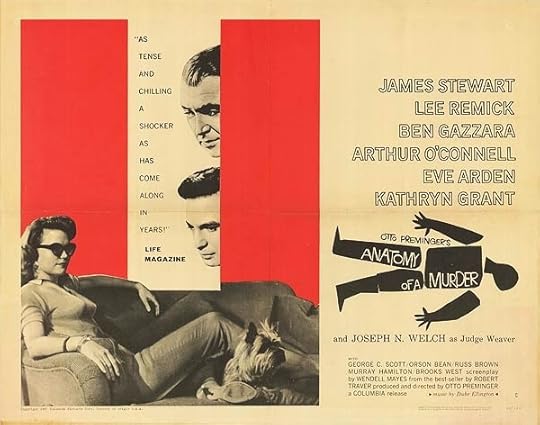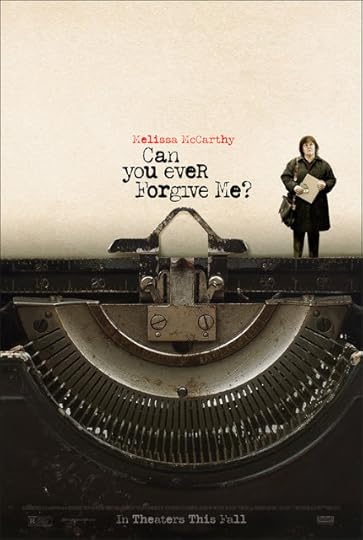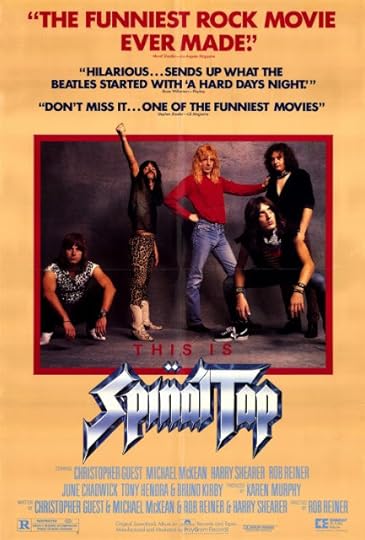Movies I Watched in April, Part 2
Picking up where we left off...

Watched this one for an upcoming episode of the Plain Label Podcast with my pal Eric Williams, though, to be honest, I don’t need much of an excuse to revisit one of my favorite movies of all time. I consider it the best courtroom drama ever made, not because it’s so entertaining (though it definitely is), but because it’s surprisingly honest about the way the law works. Our hero, Jimmy Stewart, is defending Ben Gazzara, who is accused of killing the man who raped his wife (Lee Remick). Thing is, we – and, for that matter, Stewart and his legal team – don’t know what really happened, aside from the fact that a man is dead and Gazzara’s character killed him. Remick may have been raped, or she might have had consensual sex. She might have got that black eye from the deceased, or she might have got it from Gazzara. And that’s just for starters. But unlike lesser, cornier courtroom drama, Stewart’s job isn’t to uncover the truth or acheive justice – it’s to get his client acquitted, pure and simple. The prosecuting attorney (George C. Scott, amazingly young) is so slick you assume he’s the villain, but he’s just doing his job, like Stewart, and just like Stewart, he might be right or wrong about what actually happened. That makes “Anatomy of a Murder” sound like a dark, clinical examination of truth and the law, but it’s actually just the opposite – it’s a fast-paced, fully realized drama with plenty of laughs, surprises and plot twists. Plus, director Otto Preminger assembled a murderer’s row (hardy har har) of actors to bring this (fact-based) tale to life: Stewart, Scott, Remick, Gazzara, Eve Arden, Arthur O’Connell, Orson Bean, Murray Hamilton, Howard McNear (Floyd the Barber!), Duke Ellington (who wrote the incredible score and has a cameo) and Joseph Welch, the man who in real life brought down Joe McCarthy! Whew!

Speaking of fact-based, here’s a good (but not great) movie about Lee Israel (Melissa McCarthy), a struggling-bordering-on-failed author who stumbles onto a clever money-making scheme: Given her knowledge of (a) dead authors and (b) forgery, she’ll create signed notes and letters from famous folks and sell them to bookstores and antique dealers, thus earning money to pay her rent and veterinarian bills. Along the way, she meets a dedicated drunk played by Richard E. Grant, who becomes her accomplice in fraud. The plot isn’t exactly the tightest one I’ve ever seen – things just sort of happen until it all goes wrong, which is what we were expecting all along, anyway. But the interplay between McCarthy and Grant is top-notch, the sort of effortless acting you don’t see enough these days, especially from traditionally comic performers taking a temporary serious detour. Also, director Marielle Heller and her crew recreate early 1990s New York in refreshingly low-key way, not shoving the era in your face but reminding you that this took place in a long-ago era when you couldn’t check an autograph with a quick internet search.

I teased this movie at the end of the last post, calling it “one of the greatest comedies in the history of film,” and I stand by that statement. Sure, it’s the sort of film everyone from half-bombed goofballs to suburban dads quote endlessly, but you can’t just a cinema classic by the audience that loves it. (And at various times in my life, I’ve been a proud member of both groups.) “This is Spinal Tap, which is 35 years old this year (!) is more than just a spoof of the heavy metal lifestyle. It’s that, of course, and a damn good one, but it’s also (a) the story of two aging friends, (b) a technically perfect fake documentary and (c) a collection of some genuinely solid songs. That last one is especially key, because there’s a lot of music in “Spinal Tap,” and if it weren't enjoyable to listen to, audiences would've bail long before the end credits (and Nigel’s story of working in a haberdashery) roll. See, the joke in “Spinal Tap” is that the band members are idiots, not incompetent. The musicians (and the actors who bring them to life) can sing, play their instruments and write catchy songs, which means tunes like “Hellhole,” “Big Bottoms” and “Tonight I’m Gonna Rock You Tonight” manage to be both fun and sharply satirical. And the fact that they mock not just mid-80s heavy metal but also Beatles-esque pop and flower-powered folk helps make “Spinal Tap” the movie a credible portrait of Spinal Tap the band. There’s so much detail that the group’s fake history is fully fleshed out, and the inevitable re-viewings are always rewarded with new observations and laughs. My favorite joke from this most recent rewatch? Band manager Ian telling the group not to worry about the Boston gig being cancelled because “It’s not a big college town.”
Up next: We finally wrap up April with an '80s horror flick that holds up surprisingly well and the box office champ of the year -- and possibly, eventually ... all time.

Watched this one for an upcoming episode of the Plain Label Podcast with my pal Eric Williams, though, to be honest, I don’t need much of an excuse to revisit one of my favorite movies of all time. I consider it the best courtroom drama ever made, not because it’s so entertaining (though it definitely is), but because it’s surprisingly honest about the way the law works. Our hero, Jimmy Stewart, is defending Ben Gazzara, who is accused of killing the man who raped his wife (Lee Remick). Thing is, we – and, for that matter, Stewart and his legal team – don’t know what really happened, aside from the fact that a man is dead and Gazzara’s character killed him. Remick may have been raped, or she might have had consensual sex. She might have got that black eye from the deceased, or she might have got it from Gazzara. And that’s just for starters. But unlike lesser, cornier courtroom drama, Stewart’s job isn’t to uncover the truth or acheive justice – it’s to get his client acquitted, pure and simple. The prosecuting attorney (George C. Scott, amazingly young) is so slick you assume he’s the villain, but he’s just doing his job, like Stewart, and just like Stewart, he might be right or wrong about what actually happened. That makes “Anatomy of a Murder” sound like a dark, clinical examination of truth and the law, but it’s actually just the opposite – it’s a fast-paced, fully realized drama with plenty of laughs, surprises and plot twists. Plus, director Otto Preminger assembled a murderer’s row (hardy har har) of actors to bring this (fact-based) tale to life: Stewart, Scott, Remick, Gazzara, Eve Arden, Arthur O’Connell, Orson Bean, Murray Hamilton, Howard McNear (Floyd the Barber!), Duke Ellington (who wrote the incredible score and has a cameo) and Joseph Welch, the man who in real life brought down Joe McCarthy! Whew!

Speaking of fact-based, here’s a good (but not great) movie about Lee Israel (Melissa McCarthy), a struggling-bordering-on-failed author who stumbles onto a clever money-making scheme: Given her knowledge of (a) dead authors and (b) forgery, she’ll create signed notes and letters from famous folks and sell them to bookstores and antique dealers, thus earning money to pay her rent and veterinarian bills. Along the way, she meets a dedicated drunk played by Richard E. Grant, who becomes her accomplice in fraud. The plot isn’t exactly the tightest one I’ve ever seen – things just sort of happen until it all goes wrong, which is what we were expecting all along, anyway. But the interplay between McCarthy and Grant is top-notch, the sort of effortless acting you don’t see enough these days, especially from traditionally comic performers taking a temporary serious detour. Also, director Marielle Heller and her crew recreate early 1990s New York in refreshingly low-key way, not shoving the era in your face but reminding you that this took place in a long-ago era when you couldn’t check an autograph with a quick internet search.

I teased this movie at the end of the last post, calling it “one of the greatest comedies in the history of film,” and I stand by that statement. Sure, it’s the sort of film everyone from half-bombed goofballs to suburban dads quote endlessly, but you can’t just a cinema classic by the audience that loves it. (And at various times in my life, I’ve been a proud member of both groups.) “This is Spinal Tap, which is 35 years old this year (!) is more than just a spoof of the heavy metal lifestyle. It’s that, of course, and a damn good one, but it’s also (a) the story of two aging friends, (b) a technically perfect fake documentary and (c) a collection of some genuinely solid songs. That last one is especially key, because there’s a lot of music in “Spinal Tap,” and if it weren't enjoyable to listen to, audiences would've bail long before the end credits (and Nigel’s story of working in a haberdashery) roll. See, the joke in “Spinal Tap” is that the band members are idiots, not incompetent. The musicians (and the actors who bring them to life) can sing, play their instruments and write catchy songs, which means tunes like “Hellhole,” “Big Bottoms” and “Tonight I’m Gonna Rock You Tonight” manage to be both fun and sharply satirical. And the fact that they mock not just mid-80s heavy metal but also Beatles-esque pop and flower-powered folk helps make “Spinal Tap” the movie a credible portrait of Spinal Tap the band. There’s so much detail that the group’s fake history is fully fleshed out, and the inevitable re-viewings are always rewarded with new observations and laughs. My favorite joke from this most recent rewatch? Band manager Ian telling the group not to worry about the Boston gig being cancelled because “It’s not a big college town.”
Up next: We finally wrap up April with an '80s horror flick that holds up surprisingly well and the box office champ of the year -- and possibly, eventually ... all time.
Published on June 07, 2019 18:13
No comments have been added yet.
Will Pfeifer's Blog
- Will Pfeifer's profile
- 23 followers
Will Pfeifer isn't a Goodreads Author
(yet),
but they
do have a blog,
so here are some recent posts imported from
their feed.



